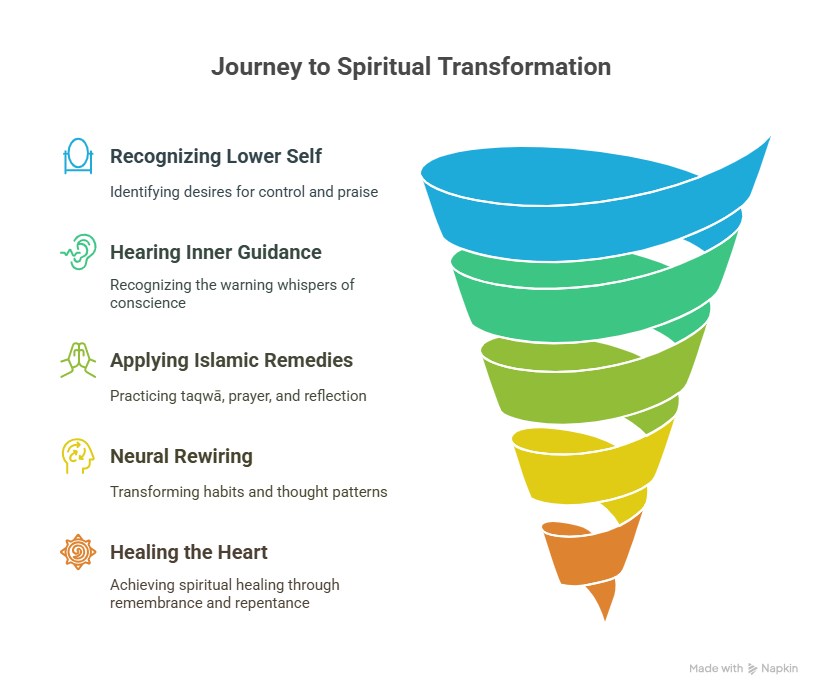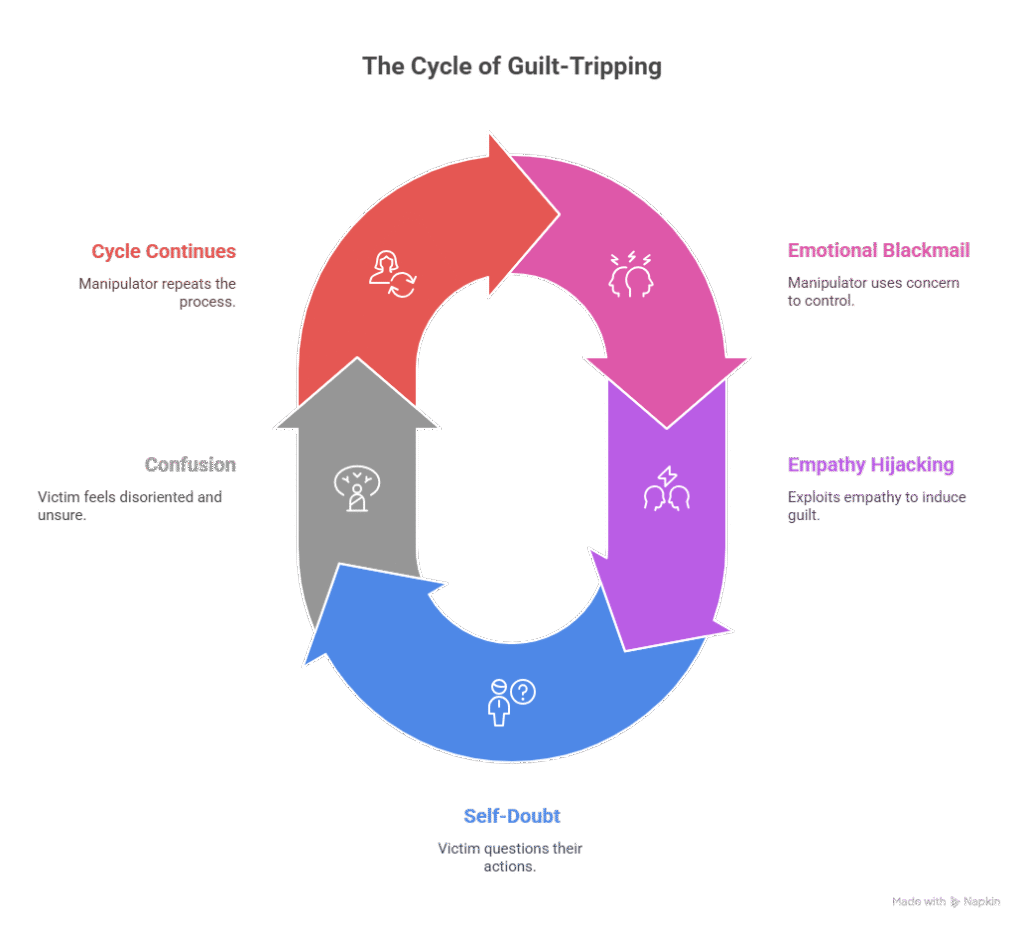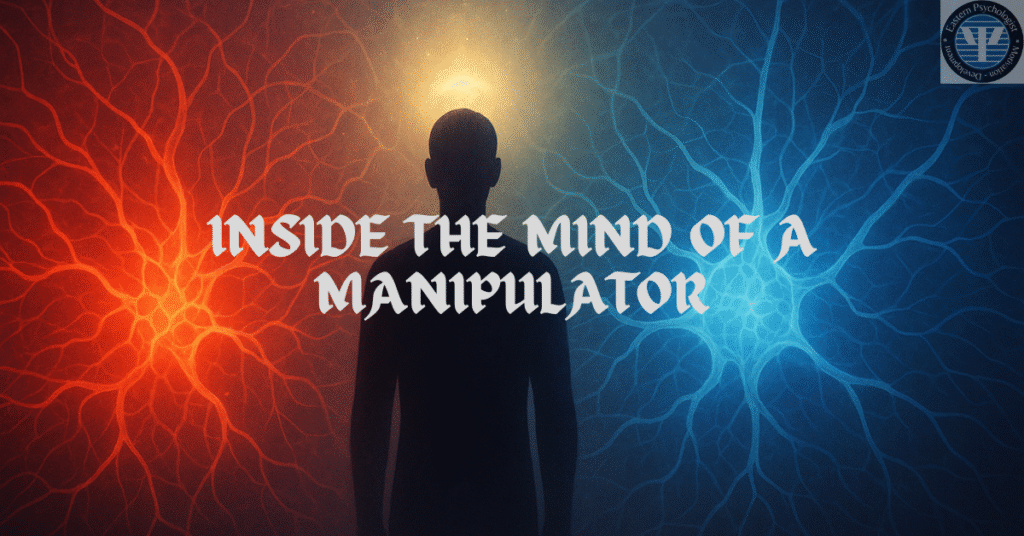Written By Raheela Shahid & Taaha Ahmad
Table of Contents
A Tale of Shadows
Late one evening in Cairo, a bright student named Aisha helped her classmate Hassan with a group project. He was charming and helpful at first, sharing snacks and praise. But over weeks, something changed: The Manipulator
Hassan’s sweet words turned into subtle guilt-trips, he repeated her secrets back to the teacher, and somehow always took credit for ideas that were not his.
Aisha was a heartbreak on one particular day when she heard him utter an untruth. Suddenly their banterings were as snipes. Her conscience (nafs al-lawwama) warned her and said: never believe him. She looked back at the Quranic verse: It is the soul that grows up in in us which is bad unless there is on it the favor of my lord.
At that time Aisha was witnessing the inner conflict: her nafs al-ammāra, the ego, was plotting and her soul was in distress. What she didn’t know was that neuroscience had already begun mapping minds like Hassan’s.
Psychologists call them high in Dark Triad traits – narcissists, Machiavellians, and psychopaths – personalities that use charm like weapons. Her story is not rare. And neither is his mind.
Dark Triad: Brains Wired for Control
Let’s get real: some people just feel off. Cold smiles. Dead eyes. Feeling the need to win, any tactics, lying, gaslighting, guilt tripping. You are welcome on the Dark Triad; a perverse trio of personality traits, narcissism, Machiavellianism, and psychopathy, all of which have one common feature, a dangerous absence of empathy.
What does the brain of a manipulator look like? Turns out, science is catching up. Studies show:
- Narcissists have reduced gray matter in reward-processing areas of the brain. They crave admiration to fill an internal void.
- Machiavellians display enhanced activity in areas linked to long-term planning and cold calculation, chess players of human emotion.
- Psychopaths often show underactivity in brain regions tied to empathy and emotional processing. They see pain but don’t feel it.
The symptoms are evident at an early age even in children. Youths high on callous-unemotional (no guilt, no fear of punishment) traits experience blunted reactions of the brain when others are hurt. The alarm bells just… don’t ring.
But here’s the twist: these traits aren’t purely born. They’re shaped. A developing brain can be rewired through childhood trauma, neglect, and/or overindulgence.
It is nature and nurture, an alchemical brew of chemicals that were developed over the years. Hassan was not born a manipulator. He became one.
And these changes aren’t always visible. They hide beneath layers of smiles, false empathy, and smooth apologies. The manipulator learns to wear a mask and wears it well.
Let’s also look at dopamine, the brain’s pleasure chemical. Manipulators often have heightened dopamine sensitivity, especially narcissists. That means they get a bigger internal “high” from social wins, be it attention, flattery, or control.
This reinforces their behaviors, creating a feedback loop of ego-boosting habits that only deepen over time.
Islamic Insight: Battle of the Nafs
Now zoom out. Let’s move from neurons to souls.
Islam speaks of the nafs, the inner self, as layered. There’s:
- Nafs al-Ammāra – the commanding self, pushing toward evil.
- Nafs al-Lawwāma – the blaming soul, conscience stirring guilt.
- Nafs al-Mutma’innah – the tranquil soul, content in divine truth.
Hassan? He’s stuck in nafs al-ammāra. His lower self wants control, praise, and power at any cost. But that whisper Aisha hears? That’s nafs al-lawwāma, warning her, guiding her away.
The Prophet (SAW) annoyed us hypocrisy in a nasty way: He said when he talks lies, when he is trusted he betrays, when he promises he goes back on it.
Sound familiar?
But Islam doesn’t just diagnose darkness, it offers a way out. The remedy? Praying, getting humiliated, thinking, feeling pity, Taqwa (a state of awareness of Allah). According to the Prophet (SAW), the one with strength is not able to overpower the other but the person who can control his anger.
That’s not just spiritual advice, it’s neural rewiring in motion. Habits of the heart transform patterns of the brain. Religion is a scalpel and cuts new nerve pathways.
There is also a reference of diseased heart (qalbun marid) in Quran that blinds an individual to truth, empathy and compassion. And it does not end here because it also informs us that hearts can be healed by remembrance (dhikr), honesty and truly repenting. (tawba).

The War Within
Back to Hassan. On the outside, he’s winning. He’s admired. Feared. Untouchable. On the inside? It’s a storm. That void doesn’t go away. Praise never fills it. Love feels fake. And guilt? It’s just background noise, until it’s not.
Deep down, even manipulators feel the pull of truth. The conscience fights back, especially when life begins to unravel. And here’s where the real war happens, not just in the brain, but in the soul.
Neuroscience and Islam agree: change is possible. The brain remains plastic. The heart can turn. But only if the manipulator stops feeding the ego and starts facing the mirror.
That means acknowledging harm. Feeling it. Mourning it. And replacing control with connection.
The Prophet ﷺ was once offered a mountain of gold, but chose a life of simplicity. He taught that real power isn’t in domination, but in discipline. That’s the contrast. That’s the light.
And this struggle? It’s personal because we all have a Hassan inside us. A part that manipulates. A part that craves validation. That fears exposure. That lies to survive.
Self-awareness is the sword. Accountability is the shield. Without them, the internal war is lost before it begins.
The Mechanics of Guilt-Tripping
Guilt-tripping is one of the manipulator’s favorite tools. It’s not loud. It’s not direct. It’s emotional blackmail dressed in concern. It sounds like: “After all I’ve done for you, this is how you treat me?” or “I guess you don’t care about me at all.”
What’s happening here is empathy hijacking. The manipulator plays on your sense of duty, your guilt, your desire to do right, twisting those into shackles. Your brain’s mirror neurons light up, your emotional center (amygdala) flares, and you start doubting yourself instead of their behavior. The worst part?
Guilt-tripping often leaves no clear crime. Just a fog of confusion. That’s what makes it powerful and dangerous.
The Islamic religion tells us of justice in the garb of sentiment. The aspect of guilt is supposed to be a corrective mechanism to self, but not to other people. The witness of guilt gets distorted on the person(s) who takes the act of guilt as a weapon and perverts love.

How to Spot the Darkness
Not sure if someone’s manipulating you? Here are the red flags:
- Love-bombing, then withdrawing affection.
- Guilt-tripping when you set boundaries.
- Constant lying or half-truths.
- Making you doubt your memory (gaslighting).
- Charming in public, cold in private.
- Playing the victim to avoid accountability.
- Apologising without change.
- Isolating you from support.
They’re not just annoying traits. They’re signs of deeper psychological dysfunction. And the worst part? Some manipulators don’t even realize they’re doing it.
But you can.
Aisha did.
You can train yourself to see through the fog. To trust your gut. To walk away without guilt. And to heal from emotional warfare.
And when you do? You feel not only a survivor, but a protector of people.
Healing the Hassan Within
Maybe you’re not Aisha. Maybe you’re Hassan.
Maybe you’ve lied to get ahead. Played with someone’s trust. Used charm to cover insecurity.
That doesn’t make you a monster. It makes you human.
But if you feel that inner tension, that voice saying “this isn’t who I want to be”, that’s your nafs al-lawwāma. It’s your soul asking for a course correction.
And you can begin a little ways: Never lie even at a cost.
- Apologise, but never ever as justifications.
- Give without expecting anything back.
- Ask for help. Therapy. Prayer. Connection.
- Practice stillness. Silence the noise.
- Reflect daily. Journal honestly.
- Break patterns. Choose kindness.
- Around you should have people who are around to propel you further.
It is where the ego drops off that the healing begins.
Change based on vulnerability has no chance to be built on; born of it. When you say: I have hurt people, then you stop being the slave of the shadow.
Conclusion: The Soul Isn’t Broken, Just Bruised
The mind of a manipulator is not a death sentence; it’s a mirror. And that mirror can crack or heal.
The Dark Triad traits show us how power, ego, and charm can deceive and destroy, but also how awareness can begin a different path. Islam reminds us that the soul is not static. It reaches up, or it drops, depending on what choices we make in the privacy of our own lives.
So, you are caught up in the clutches of a manipulator or you are gazing in the mirror, beware:
- Your brain can rewire.
- Your soul can soften.
- Your story isn’t finished.
You are not doomed to repeat your worst patterns.
You just have to stop running from the war inside and face it.
And maybe, just maybe, turn the darkness into light.
Call to Action
Funny enough, I do hope that this article made you think, but if it did, do not hold back. Show it to a person who has to know the truth behind the face of manipulation. Explain to them to assure them that they are not mad and neither are they the only ones.
And if you see the manipulator in yourself?
Start your redemption arc today. The soul remembers. So does God. Begin again.


Pingback: 10. Trauma Rewires the Brain, But Can Tawbah Heal the Soul? - Eastern Psychologist